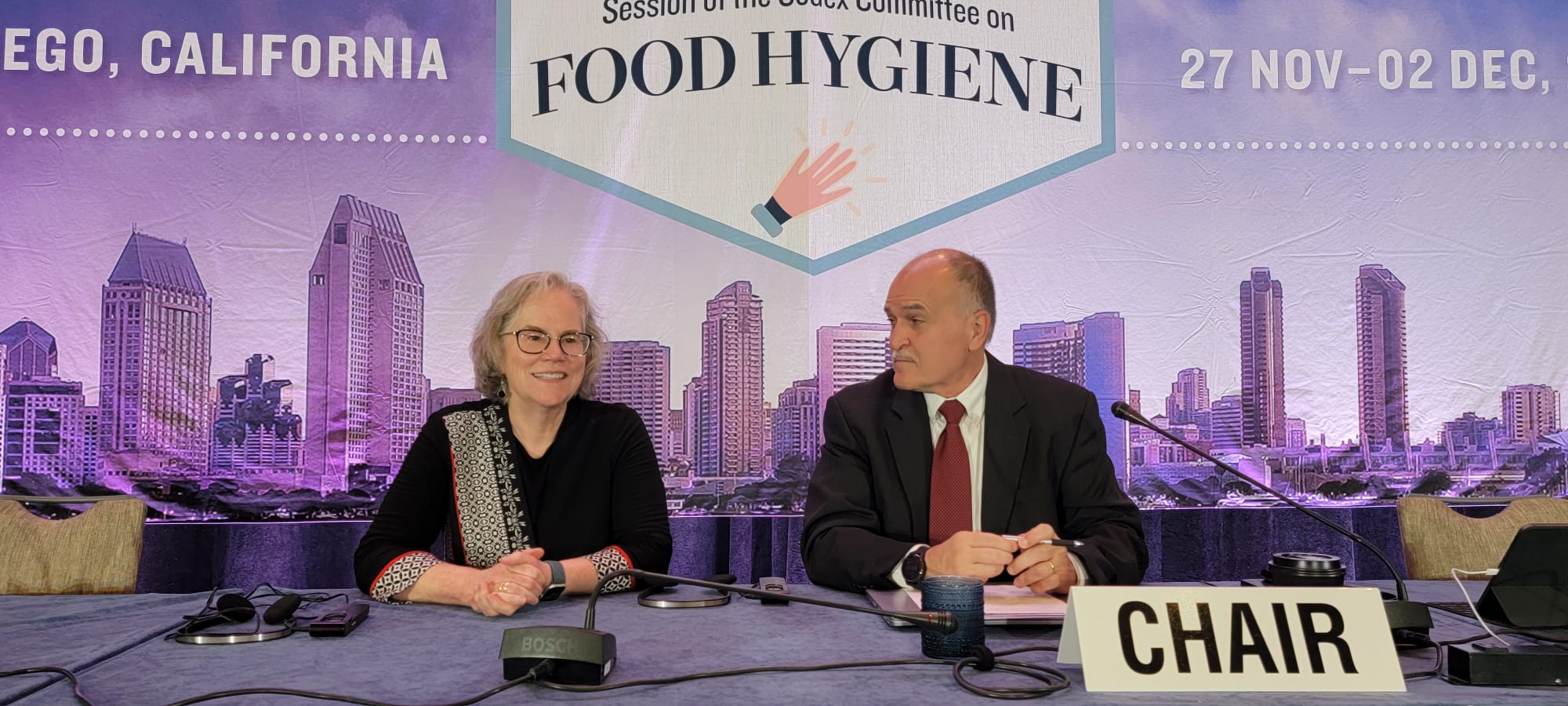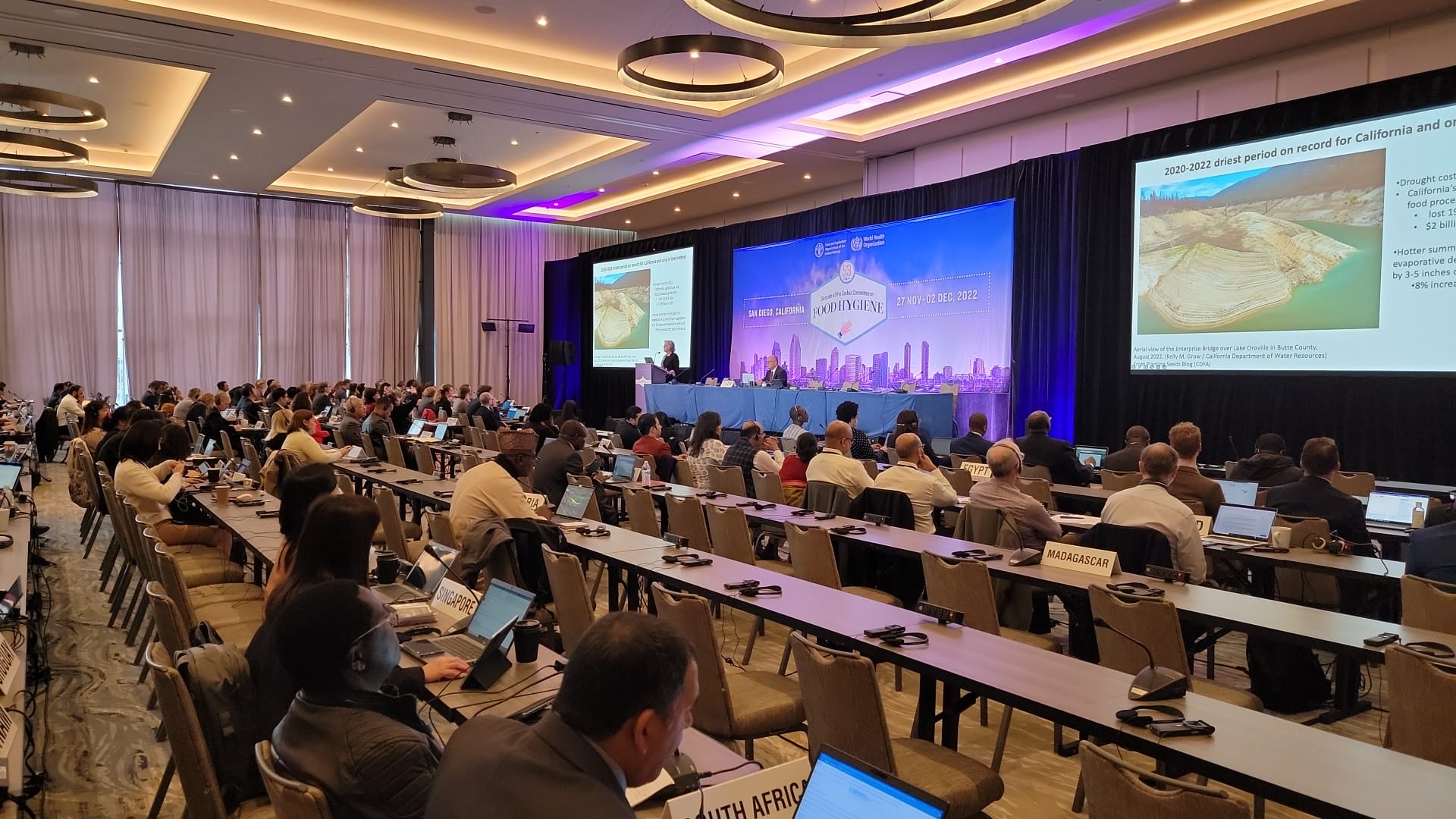Codex food hygiene meeting opens in San Diego
The 53rd session of the Codex Committee on Food Hygiene, hosted by the United States of America opened in San Diego, California on 27 November 2022, with over 200 participants from 63 countries registered to take part.
The keynote address was given by Linda J Harris, Professor of Cooperative Extension in Microbial Food Safety, Food Science and Technology at the University of California, Davis. Linking the realities of water scarcity and foodborne outbreaks in the United States to the work of the committee, Harris highlighted the cyclical nature of public health prevention and control and underlined the value of Codex work on the control of Shiga toxin-producing Escherichia coli (STEC) in raw beef, fresh leafy vegetables, raw milk and raw milk cheeses, and sprouts, as well as the proposed text on the safe use and re-use of water in food production.

Linda J Harris (left) with Chairperson Emilio Esteban
The Chairperson of the Codex Alimentarius Commission, Steve Wearne, United Kingdom, addressed the committee via video message. “The discussion of safe use and re-use of water in food production exemplifies our adaptation to the food safety challenges posed by changes in the world around us. As the proposed draft standard says, water is a dwindling resource worldwide and water in food production should be managed in such a way that the safety of food is ensured, while avoiding unnecessary consumption and waste,” he said.

Delegates at the 53rd session of the Codex Committee on Food Hygiene
The meeting, also being broadcast on Zoom, runs until Friday 2 December and closes the 2022 calendar for Codex sessions.
Learn more
Video recordings available on the Vimeo platform.
Working group: proposed draft guidelines for the control of STEC
Working group: proposed draft guidelines for the safe use and reuse of water in food production
Working Group: new work proposals/forward workplan
Photo credit ©Ken Lowery
At the heart of the Codex mandate are the core values of collaboration, inclusiveness, consensus building and transparency. Governmental and non-governmental, public and private organizations alike play a vital role in ensuring Codex texts are of the highest quality and based on sound science.
Codex would have little authority in the field of international standard setting if it did not welcome and acknowledge the valuable contributions made by observers. Expert technical bodies, industry and consumer associations
contribute to the standard-setting process in a spirit of openness, collaboration and transparency.
Intergovernmental organizations (IGOs) and international non-governmental organizations (NGOs) can apply for observer status in Codex in order to attend and put forward their views at every stage of the standard-setting process.
 Current Codex Alimentarius Commission
Current Codex Alimentarius Commission
Codex food hygiene meeting opens in San Diego
The 53rd session of the Codex Committee on Food Hygiene, hosted by the United States of America opened in San Diego, California on 27 November 2022, with over 200 participants from 63 countries registered to take part.
The keynote address was given by Linda J Harris, Professor of Cooperative Extension in Microbial Food Safety, Food Science and Technology at the University of California, Davis. Linking the realities of water scarcity and foodborne outbreaks in the United States to the work of the committee, Harris highlighted the cyclical nature of public health prevention and control and underlined the value of Codex work on the control of Shiga toxin-producing Escherichia coli (STEC) in raw beef, fresh leafy vegetables, raw milk and raw milk cheeses, and sprouts, as well as the proposed text on the safe use and re-use of water in food production.

Linda J Harris (left) with Chairperson Emilio Esteban
The Chairperson of the Codex Alimentarius Commission, Steve Wearne, United Kingdom, addressed the committee via video message. “The discussion of safe use and re-use of water in food production exemplifies our adaptation to the food safety challenges posed by changes in the world around us. As the proposed draft standard says, water is a dwindling resource worldwide and water in food production should be managed in such a way that the safety of food is ensured, while avoiding unnecessary consumption and waste,” he said.

Delegates at the 53rd session of the Codex Committee on Food Hygiene
The meeting, also being broadcast on Zoom, runs until Friday 2 December and closes the 2022 calendar for Codex sessions.
Learn more
Video recordings available on the Vimeo platform.
Working group: proposed draft guidelines for the control of STEC
Working group: proposed draft guidelines for the safe use and reuse of water in food production
Working Group: new work proposals/forward workplan
Photo credit ©Ken Lowery
 Codex and Observer
Codex and Observer
around the world since ancient times.
We might not always know where it comes from,
but we expect it to be available, safe and of good quality.









Leave a comment